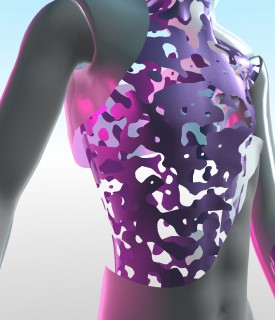Digital media continually increases our awareness of the virtuality of existence. Various applications, such as face filters, allow us to create and publish a variety of different images of ourselves. The coexistence of people, cyborgs and avatars not only changes our imagination, but also alters possible identities and forms of behaviour in private and public spaces.
The artist Tristan Schulze presents two new artworks at the GfZK. “Automaton“ takes its inspiration from the textile and pattern archive of the Tannenhauer weaving mill in Braunsdorf, which is almost 200 years old. Fabrics with Biedermeier designs are digitised using a scanner. A programme developed by the artist then generates vast numbers of new patterns from the digitised data. However, these exist only for a moment, before being overwritten by new patterns. The work demonstrates the potential of artificial intelligence, allowing visitors to experience the creativity of digital data processing in the exhibition space.
The possibility of purchasing virtual objects (clothing, accessories) for avatars in computer games has existed for years. In the meantime, this idea has been extended to the fashion industry. The first digital fashion collection has been on the market since 2019. Continuing on from “Automaton”, the second work in the exhibition, “Skins++”, questions the relationship between the fashion industry and so-called social media. Can fashion be sustainable? And how do digital communication platforms change our self-perception and self-portrayal, our consumer behaviour? What impulses does digital media provide for the visual arts and for exhibitions? And what challenges and dangers does it entail? Both works invite the interaction of visitors. However, they are not under the complete control of human beings – in Tristan Schulze’s work, the ultimate decisions are made by AI itself.
Tristan Schulze is a Leipzig artist and lecturer. His works reflect current developments in the digital world, including the examination of artificial intelligence, mixed reality or Internet of Things technologies.
Hai Nam Nguyen is the holder of a scholarship from the Kulturstiftung des Freistaates Sachsen at the GfZK. The project “Covers” is his final project. The exhibition is supported by the KdFS and the Dr. Klaus Schaffner Prize.
